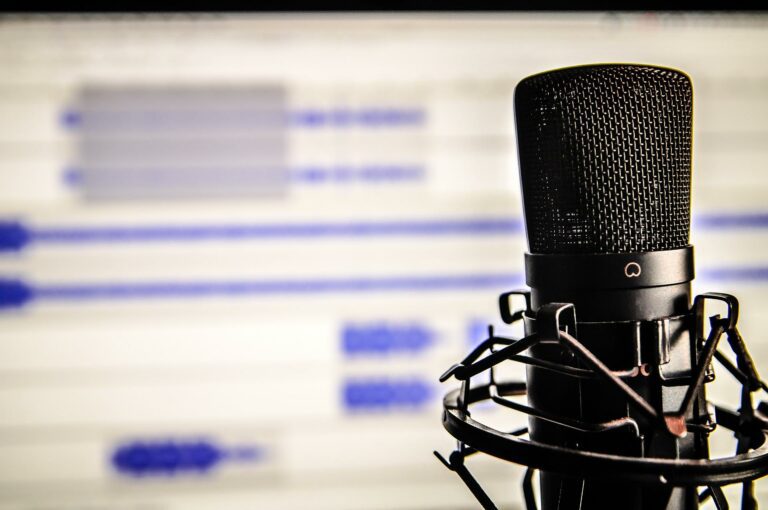There is a tidal wave of spoken word content. And trying to pick the right podcast editing software to ensure your content discovery is difficult. The spoken word traverses across every single video uploaded to a platform. And using the best podcast editing software. Helps determine your podcast’s success.
Podcasts need the support of great podcast editing software to outperform other shows on Youtube. Youtube helps improve your show’s SEO and overall discoverability. With a minefield of choices on how to edit your podcast.
This article will help you determine which podcast editing software is best.
The most successful podcasts out there are promoted in many content formats and channels
- 70% of marketers are actively investing in content marketing. (Source: Hubspot)
- 500 hours of video are uploaded to YouTube every minute / 720,000 hours of video content a day (Source: YouTube)
- 48 million podcast episodes with 550,000 active shows (Source: Apple)
- 100 million hours of video watched each day on Facebook (Source: Brandwatch)
- LinkedIn video marketing for B2B is the most effective content platform – 468 billion content impressions per year – (Source: Kinsta) and long-form written content gets the most views. Hint: that’s an opportunity for transcription!
That’s a massive digital marketplace out there for every single business. But there is one chasm to cross, cutting through and being discovered to build an audience.
Podcast creators know content is king but what draws attention?
Media organisations, brands, and independent content creators all vying for our eyeballs and eardrums. It has never been more important to have good content. The budget for content creation stretched from a few dollars to millions. At some level, however, the process is the same. You have to create, produce and then promote your content.
There are two content standards digital creators lean on:
- Talent (the people delivering the content: think Joe Rogan or Conan O’Brien)
- Topics (exactly what are people talking about).
We understand that people love to follow the talent and will “tune in” to their favourite show or host with utmost certainty. But what if you don’t have the talent of the big names? You don’t yet have the audience. How do you get discovered? Or more importantly, how do you get your content discovered?
Savvy creators use AI editing tools as part of their podcast editing software toolkit
Before we get into the technicalities and best practices of content discovery, it is important to recognise and appreciate that the way we are interacting with voice content is changing and it is being driven by ‘voice assistants’. Recently, voice assistants are changing from merely recognising simple queries to now purposefully interacting with customers and consumers.
Also, while we have screens in every room, and in the palm of our hand for almost every waking second (yes, that includes bathroom breaks!)video takes an awful amount of sensory commitment. Audio keeps you free to undertake other tasks.
Accordingly, audio and voice content is becoming a battleground for big media, big brands and big tech all at the same time.
Lastly, whilst the spoken word is our most common and most important form of communication, there are some inherent limitations with audio:
- Voice is analogue, with limitations in our digital world. It’s a sound file that is locked up and hard to analyse – so understanding and searching what is contained in an audio file is difficult.
- Audio content is generally quite long – over 30 minutes in duration on average – but we want clips and snippets of the best bits and the topics we find interesting to remain engaged
- Audio is unstructured and qualitative. It doesn’t have an international standard, no searchable links, no hosting protocols and no consistency.
What it means is that digital audio content is unmanageable on many fronts, it is hard to find the bits you want to recall, the parts you want to share on social media or with a friend, hard to recommend to others, hard to save in an orderly fashion and very hard to get personalised feeds.
All of this hinders the ability for audio to be found, discovered and readily promoted. Until now, of course, where Sonnant has created a voice discovery platform to make the spoken word accessible.
Smart spoken word AI can unearth content and help you promote your podcast time and again
For any spoken word content, any improvements in discoverability and audience engagement will bring in more people to spend time with podcasts and spoken word content.
At the very least, if you are looking for “turtle migrations” you should be able to surface search results from within an audio file. This is now a possibility. Now, if you want to share these moments you can. If you want to promote the moments, that’s easy enough too. If you want to be recommended more audio content that might be related to “turtle migrations”? Then we have already started to enable that on audio platforms.
What about your incredible archive of content, metaphorically sitting on a digital shelf gathering dust (or the digital equivalent of sitting on an external HDD gathering dust). What if that was all transcribed and turned into SEO content? It would drive more listeners or customers to your website. If you enable search on this content, you can not only re-engage your existing audience, but you can repurpose this content when it becomes relevant to attack a new audience.
What about your incredible archive of content, metaphorically sitting on a digital shelf gathering dust (or the digital equivalent of sitting on an external HDD gathering dust). What if that was all transcribed and turned into SEO content? It would drive more listeners or customers to your website. If you enable search on this content, you can not only re-engage your existing audience, but you can repurpose this content when it becomes relevant to attack a new audience.
For example, Richard Branson got past the troposphere this week. We can find when we spoke to, or about, Richard Branson’s ambitions for space. Then revive it “great to see it coming true.” You found it quickly, in seconds, you clipped it in seconds and created a promotional asset in less than a minute. Powerful discovery at your fingertips that will drive organic reach.
Problems with content discovery can be solved for digital creators with AI
We have put together a platform to drive discovery and engagement, to give listeners more of what they want through understanding topics and subjects (contextual relevance), by enabling better monetisation of content within your audience through more targeted and specific advertising and deploying less of your time and resources to more effective promotional activities because you have a deep understanding of what’s in your content.
By packaging a range of audio tools together, we are enabling content creators, podcasters, promoters, advertisers, marketers and content library owners to liberate all of their spoken word data, enabling it to be better monetised, more engaging for their audiences and empowered to be more effective for advertisers.
We have a Free Trial of Sonnant available, get 1 hour of free uploads into your library for free. Try here.




